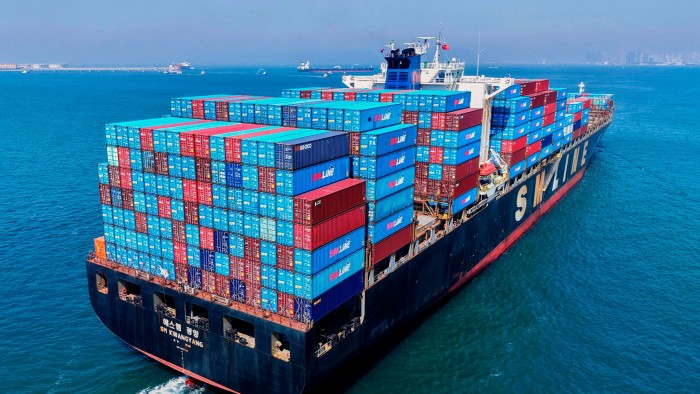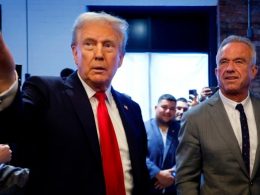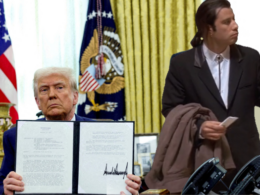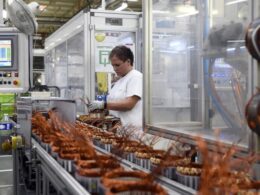Good morning. European markets were savaged yesterday as Donald Trump’s trade war got very real. Here, I unpack the carnage, while my colleagues in central Europe report on an agricultural virus causing border closures.
Join an FT Live Unhedged subscriber webinar led by Robert Armstrong on 30 April about the Trump effect on markets. Register now.
First blood
It was, said the EU’s trade tsar, a “black day”, as financial markets reeled from the sheer scale of US President Donald Trump’s trade war.
“The most important paradigm shift in global trading patterns since the second world war”, intoned EU commissioner Maroš Šefčovič, not a man prone to exaggeration or amateur dramatics.
Context: Trump imposed 20 per cent tariffs on all EU imports last week, on top of previously announced trade measures. Trade is a European Commission competence; Brussels negotiates on behalf of the EU’s 27 member states.
Yesterday’s market reaction was brutal. Germany’s headline Dax index shed 4.1 per cent; 4.8 per cent was wiped off France’s Cac 40. Polish markets crashed so hard that the Warsaw Stock Exchange suspended trading.
But more pain is still barrelling down the pipe. If unchecked, Poland’s trade minister Michal Baranowski warned, the hit to growth would ensure “a loss of jobs and wealth”.
“We remember what happened many, many years ago, many decades ago when real trade wars start”, he added, darkly.
Europe’s reaction is three-dimensional.
First: retaliation. EU member states will tomorrow vote on what Šefčovič described as “a robust list of countermeasures” on US imports that are set to come into force in a week’s time.
Officials stress the intention is not to escalate a war that “will only hurt both sides”. Instead, the aim is to bring Trump to the negotiation table: the second part of the response.
Ursula von der Leyen, Šefčovič’s boss as European Commission president, talked yesterday of a possible “good deal” around “zero-for-zero tariffs” — perhaps the first time in years that she and Elon Musk have been in agreement.
But even as they work on those two fronts, EU and national officials are simultaneously grappling with a third: how to soften the blow on the real economy.
European Central Bank policymakers warned the Financial Times of a “negative demand shock”, which could hit employment, growth and consumer sentiment.
Germany’s incoming chancellor Friedrich Merz was more direct. The economic situation was “dramatic and threatens to deteriorate further”, he said.
Market watchers now expect the ECB to cut rates next week, and then cut perhaps twice more by the end of the year, to stave off a potential recession in the Eurozone.
Fiscal policy is almost certain to follow suit: Some EU governments are already talking about the need to provide cash to the hardest hit industries, and France has dusted off its Covid-era job furlough support scheme.
It’s grim out there, and getting grimmer.
Chart du jour: Cleaning up
Thanks to wind and solar, clean energy crossed the 40 per cent global threshold last year for the first time since the 1940s, according to a new report by think-tank Ember published today.
Border beef
Foot-and-mouth disease has returned to central Europe, prompting several countries to close border crossings, write Raphael Minder, Marton Dunai and Mercedes Ruehl.
Context: After an outbreak in Germany in January, several cattle farms were hit by the disease last month on both sides of the Hungary-Slovak border, in an area also close to Austria. The disease is highly contagious and can be fatal for livestock, but not for human beings.
Last month, Hungarian authorities ordered the culling of more than 3,000 cows in the northwestern county of Győr, near Bratislava and Vienna.
Slovakia announced yesterday it would reintroduce border controls “after an assessment that some steps taken by Hungary are insufficient”, Slovak environment minister Tomáš Taraba said. Some smaller crossings could be closed altogether, based on further risk evaluations. Austria had already closed 21 crossings with Hungary and two with Slovakia.
Taraba also accused domestic Slovakian agriculture companies of failing to act swiftly, forcing the police to step up inspections that now also include drone surveillance of farms.
“I am opposed to compensation going to the big companies that have brought this on themselves by their laxity,” Taraba said.
Hungary’s farming minister István Nagy said his country had seen no new cases. Speaking at a border crossing point where the government set up a co-ordinating post, he added that work continued to prevent the spread of the disease, but high winds were complicating the efforts.
Austrian authorities said that no cases had been detected in Austria so far though the situation “remained tense”, and contingency planning was under way in case the disease was detected.
What to watch today
-
Nato secretary-general Mark Rutte visits Japan.
-
Irish trade minister Simon Harris travels to the US.
Now read these
Are you enjoying Europe Express? Sign up here to have it delivered straight to your inbox every workday at 7am CET and on Saturdays at noon CET. Do tell us what you think, we love to hear from you: europe.express@ft.com. Keep up with the latest European stories @FT Europe









